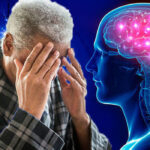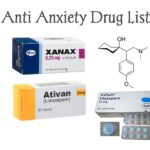Anticholinergic Drugs List

Anticholinergics are a group of medications with a wide range of physiologic effects, including effects on circulation, respiration, alertness, and vision. Drugs that possess anticholinergic activity are useful for treating the following conditions:
- Respiratory disorders (asthma, COPD)
- Parkinson’s, disease
- Cardiovascular disease
- Urge incontinence
- Psychiatric disorders
- Depression
- Mydriasis, and allergies.
How does anticholinergics work?
According to Healthline, anticholinergics works by blocking acetylcholine from binding to its receptors on certain nerve cells. They inhibit actions called parasympathetic nerve impulses.
These nerve impulses are responsible for involuntary muscle movements in the:
- gastrointestinal tract
- lungs
- urinary tract
- other parts of your body
The nerve impulses help control functions such as:
- salivation
- digestion
- urination
- mucus secretion
Blocking acetylcholine signals can decrease:
- involuntary muscle movement
- digestion
- mucus secretion
That’s why these drugs can cause certain side effects, such as:
- retaining urine
- having a dry mouth
Anticholinergic drug list
Over 600 medications possess some level of anticholinergic activity, and except in the case of a few drugs, experts generally consider the anticholinergic properties to be the cause of adverse rather than therapeutic effects.
Examples of specific anticholinergic medications where the anticholinergic activity is considered therapeutic are listed below, along with the conditions they treat:
Ipratropium and tiotropium: Function to dilate the bronchi and relieve shortness of breath and FDA approved for the use in patients with chronic obstructive pulmonary disease.
• Benztropine and trihexyphenidyl: Used to counter reduced dopamine levels and relieve symptoms of Parkinson’s disease.
• Oxybutynin and tolterodine: FDA approved for the treatment of urge incontinence and detrusor hyperactivity. Oxybutynin has an off-label use for the treatment of hyperhidrosis.
• Diphenhydramine and other anti-histamines: FDA approved as a sleeping aid
• Scopolamine: Used as prophylactic anti-emetic.
• Atropine: Used to dilate pupil during retina visualization and in the treatment of cholinergic toxicity.
• Vecuronium and Succinylcholine: Antinicotinic medications used as a neuromuscular blockade in surgeries.
• Mecamylamine: Used strictly in research settings as a ganglionic blocker.
• Glycopyrrolate: A type of quaternary amine used in anesthesia to decrease salivary and tracheal secretions.
Medications like antipsychotics, tricyclic antidepressants, and diphenhydramine (when used to treat allergies) all possess anticholinergic properties despite it not being responsible for their therapeutic qualities.
Examples of common anticholinergic drugs include:
- Antipsychotics (clozapine, quetiapine)
- Atropine
- Benztropine
- Biperiden
- Bupropion
- Chlorpheniramine
- Certain SSRIs (Paroxetine)
- Dextromethorphan
- Doxacurium
- Dicyclomine (Dicycloverine)
- Dimenhydrinate
- Diphenhydramine
- Doxepin
- Doxylamine
- Flavoxate
- Glycopyrrolate
- Glycopyrronium
- Hexamethonium
- Hyoscyamine
- Ipratropium
- Mecamylamine
- Orphenadrine
- Oxitropium
- Oxybutynin
- Promethazine
- Propantheline bromide
- Scopolamine
- Solifenacin
- Tolterodine
- Tiotropium
- Tricyclic antidepressants
- Tropicamide
- Tubocurarine
- Umeclidinium
What are the possible side effects of anticholinergic drugs?
According to experts, a suitable prescription, anticholinergics is usually safe, but some people do experience side effects. The potential side effects depend on the individual’s medical history, as well as the dosage and specific type of anticholinergics that they take.
Possible side effects include:
- confusion
- hallucinations
- memory problems
- dry mouth
- blurry vision
- constipation
- drowsiness
- sedation
- trouble urinating
- delirium
- decreased sweating
- decreased saliva
Some research has linked the long-term use of anticholinergics in older people to an increased risk of dementia. A doctor should consider a person’s age, health conditions, and other medications before prescribing these drugs.
It is essential to remain hydrated when taking anticholinergics because they decrease sweating, which may increase the risk of heatstroke.
Taking anticholinergics with alcohol or taking too many anticholinergics can result in overdose symptoms, such as:
- dizziness
- extreme drowsiness
- fever
- severe hallucinations
- confusion
- trouble breathing
- clumsiness and slurred speech
- fast heartbeat
- flushing and warmth of the skin
An overdose may also result in death.
If anyone notices these signs in themselves or another person, they should seek emergency medical attention.





